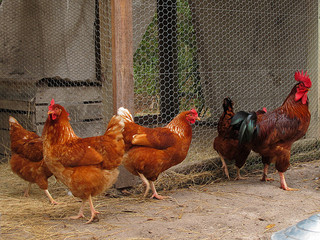How to Raise Chickens:
Raising Chicken for Eggs and Meat Production
One way to prepare for tough times is learning how to raise chickens. You and your family will have a food supply at a minimal time and money expense. Chickens are easy and inexpensive to maintain and they will provide fresh and nutritious eggs, weed control, fertilizer and even meat.
Care for Baby Chicks

Photo courtesy of Kristine Paulus
Once you determine which chicken breeds are the best for your purposes, then it's time to get started.
The first step in raising chickens is securing a heated enclosure called a brooder. You can use a cardboard box, plastic tub, kiddie pool or anything else that will keep the chicks contained. In order for the chicks to survive, the brooder will need:
- 250-watt heat lamp- The area under the lamp should be 95 degrees, decreasing five degrees a week until the chicks are fully feathered, which takes about 60 days.
- Water source- A shallow cup with marbles set in the water will prevent drowning.
- Food-Chick feeder and chick starter feed are needed.
- Bedding- Pine shavings are best, straw or dry leaves will work, but never use newspapers.
The baby chicks will settle into their brooder, which will keep them warm and comfortable. Check on them often in the beginning and keep their food and water clean. After the first week or two, they can leave the brooder for short periods. As you learn how to raise your own chickens, you will find they are curious and enjoy playtime. It is not uncommon for chicks to bond with their owners.
Care for Growing Chickens
The answer to raising chickens changes when the chicks become young pullets and cockerels. Chickens can roam or be confined but make sure they have plenty of space and protection from predators. Adult accommodation should include:
- Chicken Coop- Provide a minimum of four square feet per chicken inside the coop and a minimum of eight square feet per chicken outside. The less outside space they have the more inside space they need. Important features are space, protection, roosting poles, ventilation and nest boxes.
- Flooring- Pine shavings is a key component.
- Chicken feed- High-protein for laying hens, and grower/broiler or finisher feed for meat birds meets their needs. You can also make your own chicken feed, as hens love kitchen scraps, grass clippings and weeds.
- Water- Hanging water supplies are best to keep it clean
- Grit- Small stones are necessary for chickens to break down their food and may be included in chicken feed or a gravel driveway or other source of sand will work too.
- Treats – Scratch is a combination of corn, oats, wheat and rye that chickens enjoy.
Make sure to have adequate chicken wire and fencing around the coop to discourage predators, which is a key component of the answer to raising chickens. If they are out in the yard, they will naturally return to their coop at night to roost or you can train them to return to the coop by feeding at a specific time each day.
Maintaining the Flock
Hens and roosters need some attention to keep them healthy and alive that include:
- Check water and feed
- Collect eggs
- Observe the flock to make sure they are healthy
Periodically, you should:
- Inspect bedding- Smaller flocks need fresh bedding monthly, larger flocks add three to four inches of bedding when droppings build up and remove all bedding twice a year
- Freshen nest boxes when soiled with droppings or broken eggs
- Clean and sanitize water supply
- Clean and sanitize coop once a year
Keeping up with these chores will keep them content and provide endless amounts of farm-fresh eggs and meat.
Additional Requirements for How to Raise Chickens
Dust baths are an important part of how to raise chickens. Dust baths will help prevent parasites on their feathers and skin plus chickens like them. Even if the birds run free part of the time, place a box of deep, dry and loose dirt near their pen.
Young hens will start laying five or six eggs per week at about 20 to 24 weeks old. Productivity will vary throughout the year and with the age of the hens. A rooster is not a necessary part of raising chickens unless you want fertilized eggs, which will produce more baby chicks. Hens will lay just as many eggs whether or not you have a rooster. A rooster will help protect the flock by guarding against predators and alerting about danger.
Chickens are fun, friendly creatures that will provide necessary food in tough times. They do not need many supplies to keep them happy and knowing how to raise chickens will provide you with laying hens for eggs or meat birds.





New! Comments
Have your say about what you just read! Leave me a comment in the box below.